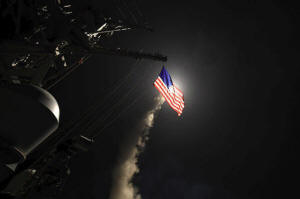|
In abrupt shift on Syria, Trump turns to
military advisers
 Send a link to a friend
Send a link to a friend
 [April 07, 2017]
By John Walcott and Steve Holland [April 07, 2017]
By John Walcott and Steve Holland
WASHINGTON/PALM BEACH (Reuters) - Hours
after a poison gas attack in Syria killed dozens of civilians on
Tuesday, President Donald Trump's intelligence advisers provided
evidence Syrian leader Bashar al-Assad was behind the atrocity,
officials said.
Trump, who had long said the top U.S. priority in Syria should be to
fight Islamic State, immediately ordered a list of options to punish
Assad, according to senior officials who took part in the flurry of
closed-door meetings that played out over two days.
Confronting his first foreign policy crisis, Trump relied on seasoned
military experts rather than the political operatives who had dominated
policy in the first weeks of his presidency and showed a willingness to
move quickly, officials involved in the deliberations said.
On Thursday afternoon, Trump ordered the launch of a barrage of cruise
missiles against the Shayrat air field north of Damascus, which the
Pentagon says was used to store the chemical weapons used in the attack.
"I think it does demonstrate that President Trump is willing to act when
governments and actors cross the line ... It is clear that President
Trump made that statement to the world, Secretary of State Rex
Tillerson told reporters.

Senior administration officials said they met with Trump as early as
Tuesday evening and presented options including sanctions, diplomatic
pressure and a military plan to strike Syria drawn up well before he
took office.
He had a lot of questions and said he wanted to think about it but he
also had some points he wanted to make. He wanted the options refined,
one official said.
On Wednesday morning, Trump's military advisers said they knew which
Syrian air base was used to launch the chemical attack and that they had
tracked the Sukhoi-22 jet that carried it out.
Trump told them to focus on the military plans.
It was a matter of dusting those off and adapting them for the current
target set and timing, said another official.
'YOU'LL SEE'
That same afternoon, Trump appeared in the White House Rose Garden and
said the "unspeakable" attack against "even beautiful little babies" had
changed his attitude toward Assad.
Asked then whether he was formulating a new policy on Syria, Trump
replied: "You'll see."
By late afternoon on Thursday, the U.S. Joint Chiefs of Staff met at the
Pentagon to finalize the plan for the military strikes as Trump headed
to his Mar-a-Lago resort in Florida for a summit meeting with Chinese
President Xi Jinping.
[to top of second column] |

U.S. Navy guided-missile destroyer USS Porter (DDG 78) conducts
strike operations while in the Mediterranean Sea which U.S. Defense
Department said was a part of cruise missile strike against Syria on
April 7, 2017. Ford Williams/Courtesy U.S. Navy/Handout via REUTERS

At another meeting there, Trump signed off on the missile attacks
and went to dinner with Xi.
Two U.S. warships the USS Ross and the USS Porter fired 59
cruise missiles from the eastern Mediterranean Sea at the targeted
air base at around 8:40 p.m. ET (00:40 GMT), just as the two
presidents were finishing their meals.
Throughout the three days of meetings, Trump's key military advisers
were national security adviser H.R. McMaster, Defense Secretary Jim
Mattis and chairman of the Joint Chiefs of Staff, General Joseph
Dunford, officials said.
In a White House marked by palace intrigue, McMaster has jostled for
influence with Stephen Bannon, Trump's chief strategist, who lost
his seat on the National Security Council on Wednesday just as the
military preparations were developing.
Tillerson's State Department told allies on Thursday that a strike
against Syria was imminent, without providing details, one official
said.
But the move angered Russia, a major ally of Assad, and appeared to
diminish chances of closer cooperation with Moscow that Trump has
said is possible, especially in fighting the Islamic State militant
group.
Tillerson played down suggestions that Trump was dropping his
"America First" approach to foreign policy. And one of the other
officials involved in the planning said the cruise missile launch
was a "one-off" strike rather than the start of an escalating
campaign.
(Reporting by John Walcott, Steve Holland and Phil Stewart; Writing
by Yara Bayoumy and Kieran Murray; Editing by Kevin Krolicki and
Ralph Boulton)
[© 2017 Thomson Reuters. All rights
reserved.]
Copyright 2017 Reuters. All rights reserved. This material may not be published,
broadcast, rewritten or redistributed.

 |